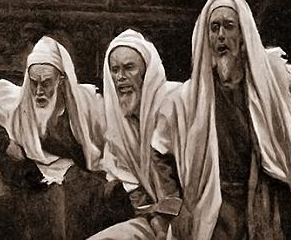 |
| Shopping carts of the homeless - Photo V. N. |
TO CHEW ON: "Yes, they made their hearts like flint, refusing to hear the law and the words which the Lord of hosts had sent by His Spirit through the former prophets. Thus great wrath came from the Lord of hosts." Zechariah 7:12
The people's representatives Sherezer, Regem-Melech, and his men came to the temple priests with a question: "Should I weep in the fifth month and fast as I have done for so many years?"
It is likely that they were inquiring about commemorating the destruction of the temple in 587 B.C. (according to the writer of my Bible's study notes, D.W. Shibley - New Spirit-Filled Life Bible, p. 1255).
God's message back to them through Zechariah may have come as a surprise. It contained no congratulations for their past piety. Instead, it pointed out things they had left undone: practicing true justice, showing mercy and compassion, treating widows and orphans well, and acting with integrity toward their neighbors (Zechariah 7:9,10).
These lacks, God said, were proof of the actual condition of their hearts—stubborn, refusing to hear, and hard ("hearts like flint") toward what really mattered to God (Zechariah 7:11,12).
I think there is a warning in this vignette for us too. We also easily reassure ourselves with spiritual activities and practices even while we may be glossing over the hard but practical aspects of obedience and what it means to love God—that is, to love our human brothers and sisters. Often our lack of love comes out in how we treat the poorest.
For me right now, I think of the homeless that trek the streets of my town. For the last few years I've seen them outside, summer through winter. The places they call home remind me of the tent city ghettos I've seen in the photos of faraway cities. I must admit these scenes stir up mixed feelings in me... not all of them positive.
I often ask myself—how do I show justice, mercy, and compassion to these, whose problems are complex (mental illness, addiction, poverty)? Is our household doing enough by supporting the local Salvation Army and the home missions arm of our church? May God never have to say to us (to me) "they refused to heed, shrugged their shoulders and stopped their ears… yes, they made their hearts like flint."
PRAYER: Dear Father, I bring to You the homeless and poor in my neighborhood. Please give me creative ideas of how to show mercy and compassion to them. Amen.
PSALM TO PRAY: Psalm 61
*********
Unless otherwise noted all Scripture quotations are taken from the New King James Version®. Copyright © 1982 by Thomas Nelson, Inc. Used by permission. All rights reserved.


















